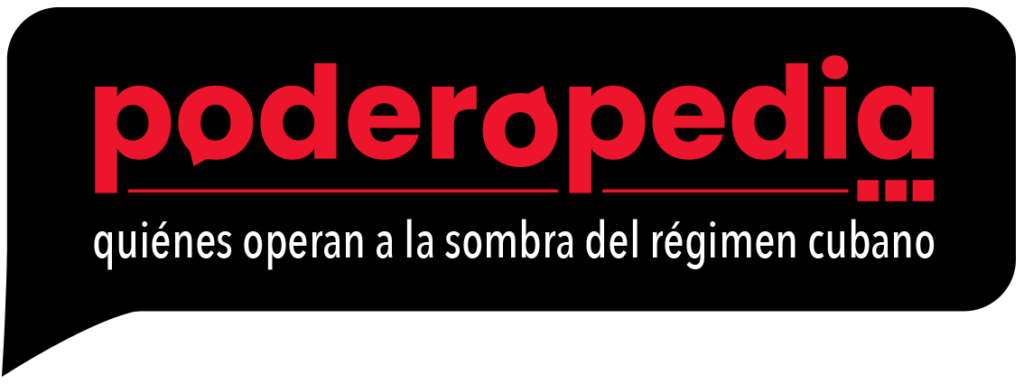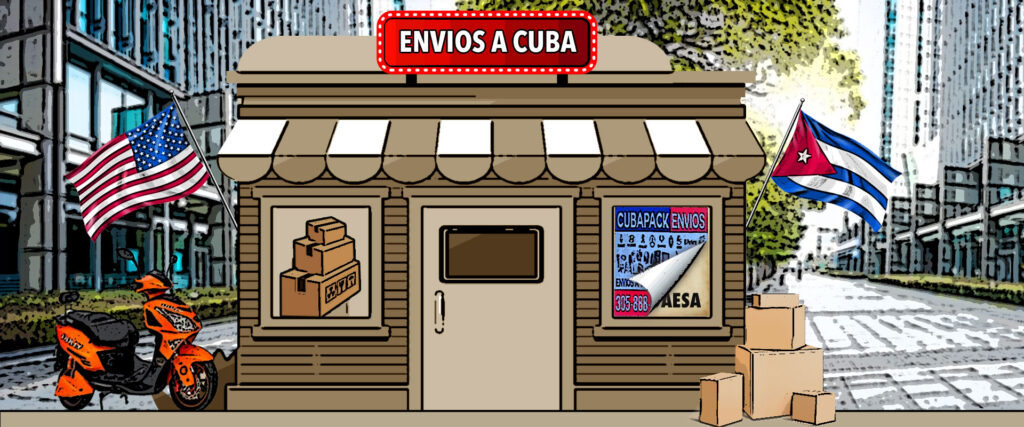Claudia Padrón Cuesta | October 2, 2023
With the largest number of Cuban emigres living in Miami, Florida and Cuba have been united for decades by a continuous flow of material and financial assistance. Families in the island depend in many cases on the medicines, clothing, articles and food products that their relatives send them through the shipping agencies that are registered in the United States.
At present, clients may think that there are several options, given the number of businesses that advertise their shipping services to Cuba. According to an official list, there are 23 different agencies in the United States where an individual can take his or her packages to have them sent approximately 90 miles away.
However, the Cuban regime does not allow these companies to forward shipments to Cuba directly. Instead, it makes them contract the services of one of the three shipping agencies that are authorized by Cuban authorities to handle shipments. The three are Cuban state agencies.
One of them is Cubapack, which not only was the first agency set up for this activity, but, also, had operated as a monopoly during many years, which is why it is the best known of the three.
This means that a significant part of the shipments that leave from Florida and touch Cuban soil officially first have gone through the Cubapack office in Miami regardless of the agency with which the client contracted services initially.
As with the majority of activities that generate hard-currency for the Cuban economy, the shipment of packages to Cuba from abroad is controlled by GAESA, the commercial conglomerate of Cuba’s Revolutionary Armed Forces (FAR, by its Spanish acronym).
As part of a system that is secretive and gives no accountability to the citizenry, GAESA is an economic group particularly inaccessible to scrutiny. They do not reveal financial statements, minutes of board meetings, or balance sheet. The only thing about GAESA that Cubans know is that they are practically the country’s administrators.
Although there are no official statistics, according to some estimates, the military conglomerate could be controlling activities that represent around 40% of Cuba’s GDP.
This degree of power and the role that Cuba’s military plays in the repression of Cuban civil society has made GAESA the main target of U.S. sanctions. Those sanctions prohibit any person or entity that is subject to U.S. law from dealing in any way with the economic arm of Cuba’s military.
For example, in 2020, president Donald Trump forced Fincimex, GAESA’s financial company, to sever ties with Western Union. This resulted I the temporary interruption of remittances to Cuba from the U.S., a source of cash flow that is as vital to many Cubans as are the shipments of packages.
To date, however, Cubapack, has escaped the attention of U.S. authorities.
In fact, the company operates discreetly, without hiding, from Hialeah, a city within Miami’s metropolitan area where the majority of the population is of Cuban origin.
There, in the heart of the Cuban exile community, Cubapack has secured a space that it shares with other businesses that are linked to GAESA, as CubaNet was able to corroborate from U.S. public records. Cubapack provides more services every day.
Now, Cubapack not only ships packages to Cuba. It has enabled both physical and online stores where it sells what the packages could hold. I this fashion, Cubapack has started selling to exiles items purchased in hard currency, which is one of the present survival strategies of the regime.
Some of the products that Cubapack later ships to Cuba, like electric motorcycles, are provided by Panamanian offshore companies that are also linked to the Cuban military. These also operate openly in Miami, as CubaNet was able to corroborate by consulting an international trade data base.
It’s a circular trade where GAESA purchases merchandise through its affiliates in other countries, then sells it to Cuban emigres in Miami so that they can ship them to Cuba, a shipment that GAESA also arranges and carries out.
All this is happening out in the open in the United States, the country that, according to the official rhetoric, enforces a “genocidal blockade” against Cuba.
Cubapack’s road to Miami
Today, Cubapack is part of the Cimex Corporation, as admitted by Cuban authorities. It is one of GAESA’s most important enterprises.
Cimex was initially registered in Panama in May 1979. To operate as a Panamanian company would allow the regime’s leadership to circumvent U.S. sanctions and operate with greater ease in international markets, opening accounts, moving money or purchasing hard currency.
Since then, the company has been growing and creating more Panamanian entities. In 1984, for instance, they created the finance company Fincimex, which is in charge of handling the remittances business.
Sometime later, they created Cubapack to control the shipment of packages. They first established themselves in Miami in the late eighties, as it appears in public U.S. records.
Back then, Cimex operated very discreetly from abroad, without calling any attention to its inks with the Cuban regime.
However, as Cuban authorities gradually dollarized the economy in order to survive the crisis that resulted from the collapse of the Soviet Union and the country became more dependent on external income sources, Cimex became the more visible and relevant.
They not only controlled remittances and package shipments, but also became involved in tourism and real estate; opened dollarized store chains; established banks and bank-card-and-credit-issuing entities; shipping companies, and car-rental agencies.
Cubapack
Forwarding agency that handles and delivers cargo and messaging, nationally and internationally, and conducts sales of food and non-food products through a catalogue. Affiliated to the CIMEX Corporation (Corporación CIMEX S.A.).
Address: Calle 22 No. 4115 entre 41 y 47, Playa, La Habana. Cuba.
Phone: 7214-4729 / 7795-9724 / 7795-9137 / 7795-9138 / 7795-9139 ext. 1119 or 1120
E-mail: comercial.cubapack@cimex.com.cu
Web: cubapack.cu/envios
Tracking: cubapack.cu/envios
In spite of its expansion throughout the new Cuban economy, Cimex continued to operate as a Panamanian holding. In the 1990s, they registered officially in Cuba but kept the headquarters in Panama, where their income continues to flow, as economist Emilio Morales has explained.
With Raúl Castro coming to power in 2006, the authority of the Cuban military, the FAR, consolidated definitively as dominant economic actor. Cimex, one of the crown jewels, became part of the military conglomerate: GAESA.
In this fashion, the Cuban military appropriated itself of a group of companies that in 2006, the last year financial data was available before its absorption by GAESA, had income of approximately 1.3 billion dollars, according to Reuters.
Among the companies that passed to the hands of the Cuban military was Cubapack.
The relevance of this company increased as US. sanctions became more flexible and the exchange between Cubans on both sides of the Florida Straits grew during the thaw period in the Barack Obama administration.

It was during this time, in 2015, that Cubapack established itself again in the United States. The company was created in Miami by José Álvarez Díaz in June 2015 under the name Cubapack envíos travel, as it appears on the Florida trade registry. It was headquartered in a commercial space in Hialeah whose address was 400 Palm Avenue.
The Obama thaw and the increase in migration to the U.S. caused the companies specialized in packaging and deliveries to Cuba to multiply. Every day, more such companies popped up to provide those services to the public.
But the regime kept the monopoly of the wholesale operations regarding cargo and deliveries in Cuba, keeping for itself a fundamental part of the business.
The business remained in the hands of Cubapack and two more companies: one is named Palco and is also controlled by GAESA. The other one is Aerovaradero, which belongs to Cuba’s Ministry of Transportation.
Any package-and-shipping company anywhere in the U.S. must first reach an agreement with one of these three Cuban companies in order to ship and deliver packages to Cuba.
From (Cimex) company to (Cimex) MIPYME
U.S.-Cuba policy took a turn when Donald Trump assumed the presidency in January 2017. Not only did Obama’s thaw come to a holt, but the situation was reversed. Trump hardened some of the sanctions of the U.S. embargo, especially during his last two years in office.
In addition, a new policy was enacted, which consisted of identifying the companies that make up GAESA and applying selective sanctions. Many of the well-known companies controlled by the Cuban military were placed on a black list.
This implied that individuals or companies in the U.S. were prohibited from doing business with those GAESA enterprises, with few exceptions or for humanitarian reasons.
Initially, those sanctions did not affect Western Union, which had been working with Fincimex since 1995 sending remittances to Cuba.
But in late 2020, the Trump administration decided to issue an ultimatum regarding that relationship. It included Fincimex on the black list and established that the Cuban regime had to allow another company not related or affiliated to GAESA or the FAR to handle remittances with Western Union. If that did not materialize, remittances to the island –so much needed by hundreds of thousands of Cubans- would end.
Cuba did not give in to the pressure, and remittances were suspended during months. Finally, with the new administration of Joe Biden, the Cuban government authorized another company to handle remittances as Western Union’s counterpart in the island.
Although the new Cuban company, Orbit, seems to have some links to GAESA, as has been made public by Proyecto Inventario, Cuba’s decision has pleased the new administration. In March 2023, remittances to Cuba through Western Union were reestablished definitively.
However, throughout this battle between the two government over family remittances, one thing went unnoticed. The shipment of packages to Cuba was in the hands of GAESA as well. And private U.S companies that wanted to join this type of business, like Western Union, were also forced to give part of the business to GAESA.
The situation with Cubapack was not very different from that of Fincimex. Furthermore, Cubapack also had a history of collaborating with repressive measures of the regime.
In 2005, the name of this company appeared on the official propaganda portal Cubadebate. The media published the exact quantities of medicines and food that activists in exile sent, through Cubapack, to their counterparts on the island. The media disclosed the name of a recipient and the sender to expose them.
Despite these backgrounds and close ties with GAESA, Cubapack has not attracted the attention of the US government up to this point.
The company has never been on the blacklist that includes GAESA entities, and the shipping of packages has not been affected by sanctions.
However, what happened with remittances perhaps explains why Cubapack has recently become interested about becoming a Mipyme.
The GAESA company is exactly number 876 on the official list of micro, small, and medium-sized enterprises (Mipymes) authorized by Cuban authorities.
This is a legal form created in 2021, which, for the first time, allows individuals to create a private company in Cuba. Until that moment, the regime had only allowed the existence of so-called cuentapropistas, self-employed individual entrepreneurs.
The creation of Mipymes, in theory, aims to encourage private initiative. Its purpose is to make it easier for former cuentapropistas to access loans or receive funding from other investors and thus be able to grow their businesses.
However, in practice, this measure, although supported by some groups, has faced strong criticism. Detractors question whether many of the new Mipymes are truly private. One of the arguments put forth by critics is that behind several of these apparently new businesses are the same state authorities or people connected to them.
Another criticism that Mipymes get is that they are actually formed to offer a disguised version of state-owned enterprises that makes them appear private abroad and thus exempt them from the embargo’s sanctions.
For years, the United States has advocated for the empowerment of the Cuban private sector and attempted to make its sanctions more selective to impact state-owned companies, but not those that are not. However, the conversion of a state-owned company like Cubapack into a Mipyme (micro, small, and medium-sized enterprise) does not exactly help dispel these accusations.
What does the FAR (Cuban Revolutionary Armed Forces) gain by turning Cubapack into a Mipyme? “First, it would be a new company that is not explicitly sanctioned. Second, it could benefit from any change in U.S. policy that benefits Mipymes. Third, it could access lines of credit,” explained Emilio Morales, President of The Havana Consulting Group.
“It’s a multi-purpose strategy, with the main goal being recognized as a private company in the United States, which, if OFAC (Office of Foreign Assets Control) gives it the green light for each request, prevents it from being subject to sanctions. In this way, they cannot only export and import but also apply for bank loans,” commented Juan Antonio Blanco, President of the “Cuba Siglo 21” Ideas Laboratory.
Cubapack expands its business
Since 2015, Cubapack has been officially operating on both sides of the Florida Strait.
In the Cuban capital, it has an office in the exclusive Reparto Kohly neighborhood on 22nd street, known for hosting foreign companies and diplomatic residences.
It is a distinguished company that boasts of its good relationship with the regime. In 2022, it received the Proeza Laboral award, and in 2013, it received a commemorative recognition for the assault on the Moncada Barracks, a medal awarded to workers or entities for their work results in the service of the State.
On social media, the Cuban Customs promotes the agency as one of its allies and congratulates them for their “excellent work.”
Meanwhile, on the other side of the Florida Strait, in Hialeah, the Mipyme (micro, small, and medium-sized enterprise) Cubapack is dedicated to collecting as many dollars as possible from the Cuban émigré community.
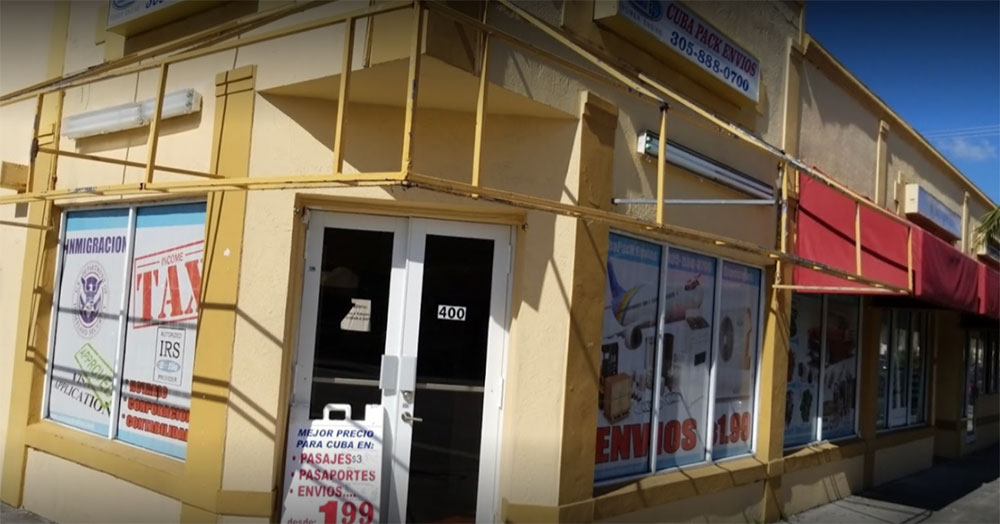
In its current branch on the West 3rd Street in Hialeah, Cubapack not only engages in its traditional activity of receiving pre-packaged parcels to send to the island.
Taking advantage of the current scarcity of basic products in Cuba and the impossibility of finding certain things for sale in the national currency, the company has joined a trend that has proliferated since the economic reforms called Tarea Ordenamiento began in 2021.
Thus, Cubapack has become another channel for selling products in foreign currency to émigrés, merchandise which they pay for and then their relatives in Cuba receive.
Some of these products are manufactured by Cuban state-owned companies, while others are imported by them.
But they all have in common that they could previously be purchased in stores in Cuban pesos or CUCs (Convertible Cuban Peso). However, now, after the disappearance of the CUC and the emergence of the MLC (Moneda Libremente Convertible, or freely-convertible currency), they can practically only be found for sale on the Internet and can only be paid for with a Visa or Mastercard.
None of these companies issue cards in Cuba, turning émigrés’ money into the only possibility for many Cuban families to buy certain basic products.
This is a very unpopular policy due to the inequality it entails. Dollarization, or the existence of multiple currencies in the country, is not new. It is a strategy that the Cuban regime has applied for decades and caused dissatisfaction and encouraged migration.
But now, the population faces a new situation. They cannot buy some items, and they don’t even have the actual cash to do so. The State has decided not to supply national markets and to sell certain goods only abroad, even when they have been produced in Cuba or are already in the country.
The websites that do this, which number in the dozens, as Cubanet has investigated, are mostly connected to GAESA (Grupo de Administración Empresarial, S.A.), other high-ranking officials, or people well-connected to the regime, like Cuban-American Hugo Cancio.
Cubapack is just one of the companies that have ventured into this activity, the purpose of which is to collect foreign currency for an economy struggling to generate it.
Now, the courier company encourages its customers to buy merchandise from them that it will also ship to Cuba. As their advertising slogan summarizes it: “Don’t bring it with you, we have it cheaper.”
In other words, not content with capturing foreign currency by monopolizing a portion of the courier business, GAESA has started to compete with private businesses in Miami for the Cuban market.
First, Cubapack began selling products in its physical store in Hialeah. Then came its online version.
Now, the courier company sells, for example, on its website, food, medicine, wheelchairs, furniture, auto parts, personal hygiene products, household appliances, tools, or school supplies. All of these products are almost non-existent in national currency state-run establishments, so the population has no choice but to buy them on websites like Cubapack.
Even three years ago, this CIMEX company promoted on its YouTube channel the sales of medicines for delivery in Cuba. This was during the toughest time of the Covid-19 pandemic when the shortage of medicines in the country was exacerbated.
GAESA in Hialeah
Cubapack is the best-known GAESA company operating in Miami. However, it is not the only one, as this investigation has found. The shipping company is actually at the center of a network of companies that also have ties to GAESA and have offshore branches in the Colón Free Zone, in Panama.
This is a massive tax-free trade area where all kinds of products, many of them manufactured in Asia, can be acquired.
It is no secret to the United States government that the Caribbean dictatorship registers companies in Panama to circumvent the commercial restrictions associated with U.S. sanctions. In fact, in 2017, the Department of State revealed that two GAESA entities were presenting themselves as Panamanian companies to subvert international trade restrictions.
In the same location in Hialeah where Cubapack operates, at least three other businesses are operating, as evidenced by the Florida business registry and photographs posted on social media.
One of them is called JA Global Group. This is a company that is headed by José Álvarez Díaz, the same individual who leads Cubapack.
In other words, both companies are headquartered in the same place, on West 3rd Street in Hialeah, and are headed by the same individual.
JA Global Group imports products into the United States, such as electric motorcycles, vehicle spare parts, or various air conditioning and household appliance devices, as shown by records from the Panjiva international trade database obtained for this report.
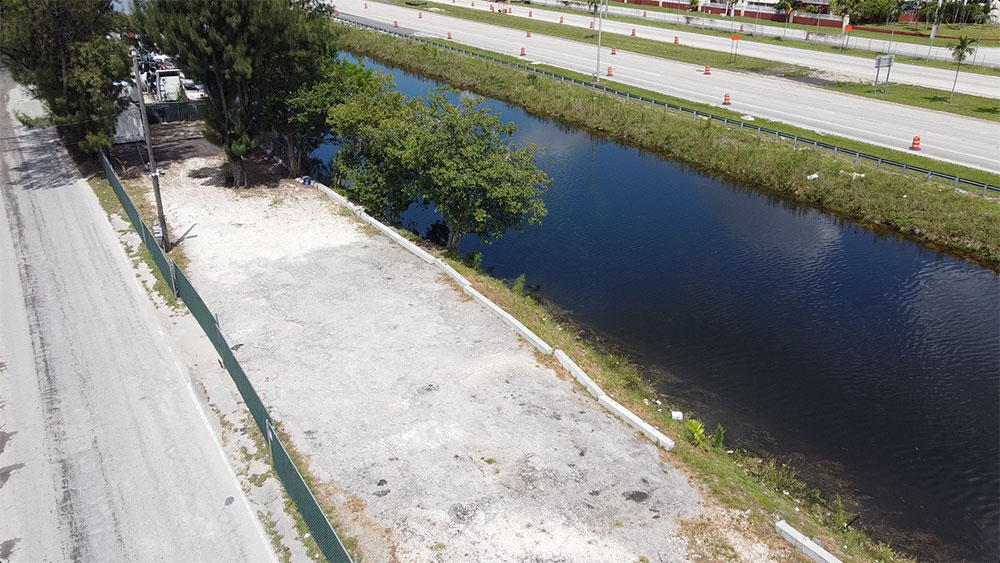
The description of several of these products coincides with what Cubapack later sells and sends to Cuba.
Additionally, for its operations, JA Global Group acquired a property in Hialeah. This property is located at 10801 South River Drive and was purchased by this GAESA-linked company for $300,000 in 2021, according to information from the Miami-Dade County property registry.
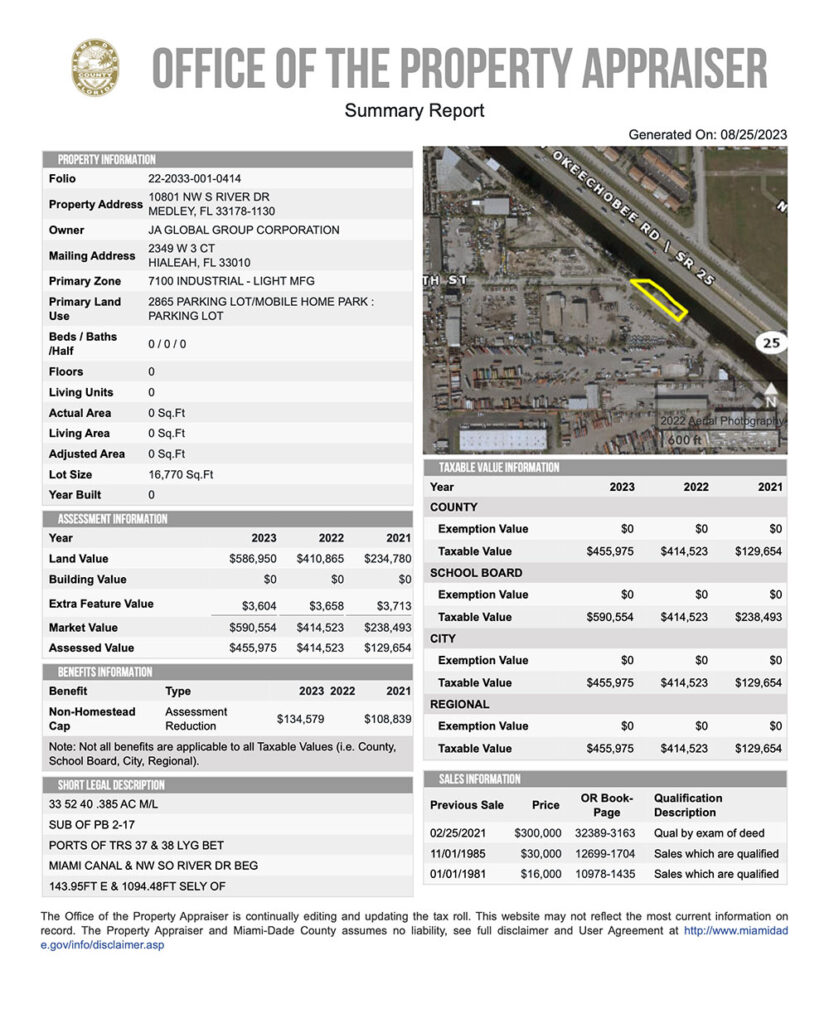
JA Global Group acquires the products it imports to the United States from suppliers in the Colón Free Zone who also have links to Cuba and GAESA.
For example, JA Global Group purchases air conditioning units in Panama from a company called Distribuidora & Cargo Caribeña SA. This is a company that is run by a Cuban citizen named Orestes Romel Martínez Martínez and is also used by GAESA to import Castrol brand lubricants to Cuba, as per information available on Panjiva.
Martínez Martínez also represents other companies that supply products to JA Global Group.
For instance, electric motorcycles are purchased from another company called SM Engine Parts, which is also located in the Colón Free Zone. These motorcycles bought from SM Engine Parts have been sold in their physical store and sent to Cuba by Cubapack, as shown in social media posts.
In fact, SM Engine Parts, although not officially registered in the United States, also operates at the same address on West 3rd Street in Hialeah, where Cubapack and JA Global Group are headquartered.
As Cubanet has confirmed, next to the sign advertising Cubapack’s services at this location, there is another sign with the name SM Engine Parts. In reality, both businesses are the same and share the same phone number.
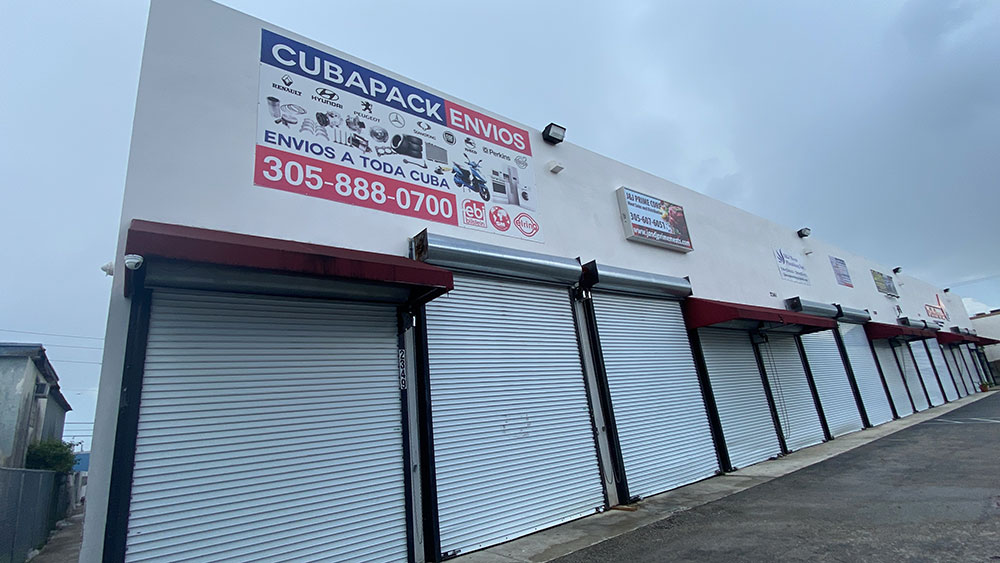
In other words, in a small warehouse in Hialeah, surrounded by multiple businesses owned by the Cuban exile community, GAESA has established its operations center. They purchase or import products through SM Engine Parts and JA Global Group and sell and send them to Cuba through Cubapack. Additionally, they have purchased a property in the United States.
More recently, in 2021, another company was added to the group. A fourth business was established at the West 3rd Street location in Hialeah, as recorded in the Miami business registry.
This company, headed by Juan Manuel Arroyo Ojeda, is Cugranca Usa LLC.
This company is actually part of a structure of companies with international presence that has been involved in shipping packages and cargo to Cuba since the 1990s.
One of its most important operating points is also the Colón Free Zone, from where they manage shipments to the island. For years, it has been common for Cuban citizens to go to Colón to purchase items that they later take back to the island or have them sent there. In Colón, they can hire the services of courier companies like Cugranca, which have multiple links to GAESA or to the regime.
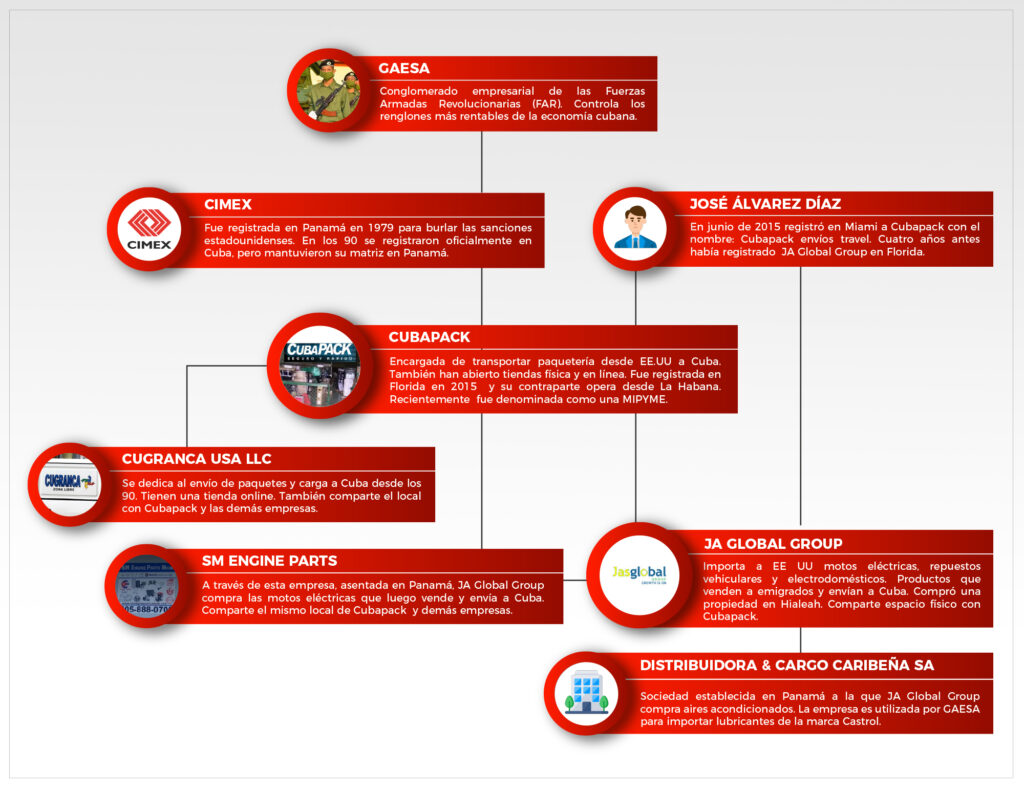
One of the representatives of Cugranca in Panama is also Orestes Romel Martínez Martínez, who holds the same posts at SM Engine Parts and other companies linked to GAESA.
Cugranca, like Cubapack, has also opened an online store for émigrés to pay in foreign currency for what their families need in Cuba.
In this store, products similar to those sold by Cubapack are offered, and they are imported by JA Global Group and SM Engine Parts.
Now, Cugranca operates openly in the United States. Just like Cubapack and other companies linked to GAESA, they have not attracted the attention of US authorities so far.
According to economist Emilio Morales, this could be due to a possible humanitarian exception. “Cubapack is the only sub-entity of CIMEX that is not sanctioned because medicines, food, and other products are sent to residents on the island through this channel,” the expert stated.
However, the same reasoning was applied to remittances for years. The operation that Western Union had with Fincimex worked smoothly for almost a quarter of a century. Until one day that money transfers became the target of U.S. sanctions.
But, as long as this doesn’t happen, Cubapack and its associated companies operate normally. Every day, they try to capture the foreign currency that the regime needs.
“The effectiveness of sanctions does not depend on how well-designed the sanctions themselves are, but on the political will of the current administration to apply them rigorously,” explained Emilio Morales. “Sometimes, political agendas do not align with sanctions,” he concluded.
For this investigation, Cubanet contacted Cubapack via WhatsApp and did not receive a response. We also wrote to Orestes Romel Martínez Martínez, who is based in Panama, and he preferred not to make any statements.
